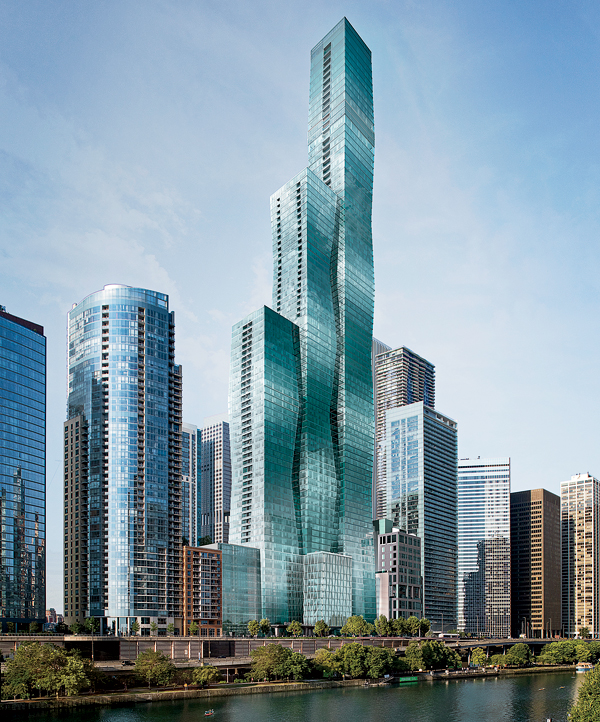
The 94-story skyscraper, one of the most ambitious residential developments in Chicago since the housing bust, has it all: 21 multimillion-dollar penthouses, a huge foreign investment, and a design by starchitect Jeanne Gang. It’s also got a Chinese developer with an uncertain financial future. Here, we answer some burning questions about the tower’s status.
The main developer’s Chinese parent, Dalian Wanda Group, has been doing a lot of restructuring. What’s that all about?
The Chinese government seems to be pressuring large conglomerates to reduce debt and trim foreign investments perceived as risky. Dalian Wanda, a giant, has the kinds of bets on real estate and entertainment (it also owns the AMC theater chain) the government appears to be checking. The company sold off billions of dollars in assets this summer, including most of its hotels. And in August, it flipped control of Vista Tower from a publicly listed company to a private one, meaning that potential condo buyers in Chicago will have a harder time divining the developer’s financial strength.
Does that mean the project is at risk?
Not at the moment. But there’s political risk in China, which could lead to financial risk here. If companies fall out of favor with China’s rulers, they can suffer. The Chinese government has been pressuring banks to decrease lending for big overseas property investments. Vista Tower has a $700 million construction loan from a midtier Chinese bank that has a portfolio heavy with nonperforming debt. If Vista’s loan falters or the Chinese government compels the bank to scale back, the project or its bank might be forced to find a new lender to keep money flowing to contractors. That could cause delays.
But Chinese investment in Chicago real estate is still a good thing, right?
In 2016, Chinese citizens bought $31.7 billion in U.S. residential properties, mostly in New York and West Coast cities. When Wanda’s 90 percent interest in Vista Tower was announced, it heralded Chicago’s chance to grab a larger share of that—especially since Wanda set up sales operations in China for the units. However, there’s a potential caveat. In other cities that attract wealthy Chinese buyers—New York, San Francisco, and Vancouver—properties are sometimes purchased merely as investments, not residences. That can leave buildings with large numbers of “ghost residents,” who do nothing to add vitality to local businesses.
So who’s buying the condos?
It’s hard to say. Jim Losik, a spokesman for Magellan Development Group, the U.S. partner that’s overseeing the project stateside, says that the majority of buyers are, and will be, from the United States. However, Linda Greenberg, a prospective buyer from Chicago who toured Vista Tower, says an agent told her that many of the upper floors are reserved for wealthy Chinese buyers. Magellan reports that 38 percent of the residential units are under contract, as of August. It also says that around one-third of the buyers are foreign and 10 are Chinese—but that number could be misleading. Often, foreigners purchase in the United States through shell companies in other countries, such as the Cayman Islands. It is also impossible to know how many Chinese buyers are in for multiple units.
How safe is it to buy in Vista Tower now?
Losik says Magellan is “not paying too much attention” to Wanda’s internal maneuvering. “We can worry, but it wouldn’t get us anywhere.” Magellan is known for delivering high-quality buildings, and it has a big financial and reputational stake in the success of Vista—so even if Wanda’s loan falters, the local developer would likely keep the project on track. The recent commotion, however, is giving some potential buyers pause: Greenberg says that she and her husband scratched the tower off their list, in part because the down payment was high (about 10 percent of the cost of the unit) and conditions to get their money back too restrictive. “Given all the news about the company,” she says, “I’m glad we didn’t go further.” (The Greenbergs have since decided not to move.)


